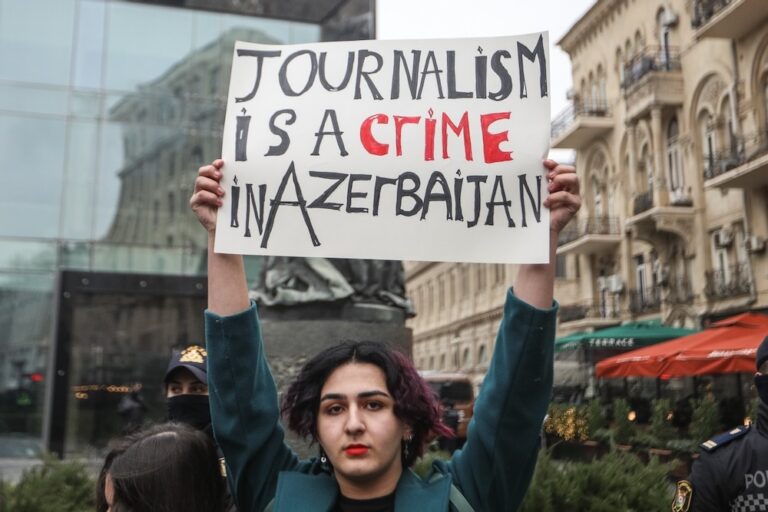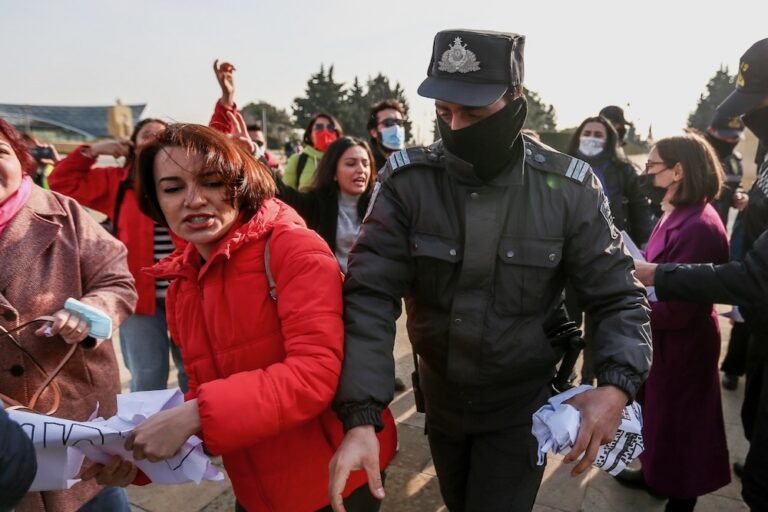Seymour Khaziyev, a reporter with the opposition daily Azadlig, joined the long list of journalists imprisoned in Azerbaijan when a judged ordered his detention for at least two months on 30 August on a charge of “aggravated hooliganism”.
Seymour Khaziyev, a reporter with the opposition daily Azadlig, joined the long list of journalists imprisoned in Azerbaijan when a judged ordered his detention for at least two months on 30 August on a charge of “aggravated hooliganism”.
He faces a possible prison sentence of between three and seven years if convicted. Reporters Without Borders says he was a victim of provocation and demands his immediate release.
Provocation used again as a weapon of intimidation
Khaziyev is an eminent Azadlig reporter and is also a presenter of the programme “Azerbaycan Saati” broadcast via the Internet and by satellite. He was arrested on 29 August near his home in the village of Jeyranbatan, on the outskirts of Baku, after an altercation with an unidentified man. Khaziyev was assaulted by the other man and defended himself using a bottle he was holding.
The police arrived quickly on the scene and arrested only the journalist, who was charged the next day with “hooliganism committed with a weapon or an object used as a weapon” under article 221.3 of the criminal code and was ordered to be held in pre-trial custody. His attacker, Maherram Hasanov, was in turn arrested on 3 September and charged with hooliganism.
Khaziyev’s lawyer and colleagues argued that he had been provoked and Hasanov was arrested merely to give the impression that the investigation was fair. This kind of tactic is used regularly against independent journalists and opposition activists.
Azadlig‘s editor, Ganimat Zahid, was arrested in November 2007 and sentenced to four years’ imprisonment, also for “aggravated hooliganism”, while the other party in the case served just six months behind bars. Two prominent bloggers, Emin Milli and Adnan Hadjizade also served several years for hooliganism.
In March 2011, Khaziyev was abducted and tortured for several hours by unidentified men who advised him to be as “intelligent and quiet as the others.”
Freedom of information being exterminated
Azerbaijan, already ranked 160th of 180 countries in the Reporters Without Borders World Press Freedom Index, has been conducting an unprecedented offensive against the last remnants of civil society over the past few months. The Baku office of IREX, an international NGO that promotes media development, was raided on 5 September and its IT equipment and documents were seized. IREX’s bank accounts were frozen during the summer, like those of some 40 other NGOs. The heads of several of the NGOs have been imprisoned, and others have fled or been forced to halt their activities.
When the authorities find themselves unable to neutralize journalists and civil society activists, they resort to targeting their families. Blackmail has been used against a number of them with the aim of persuading the activists to halt their activities. Murad Adilov, the brother of the journalist Natiq Adilov and himself active in the opposition Popular Front party, was arrested on 12 August for illegal possession of drugs, a charge often used in political cases.
Natiq Adilov, a reporter for Azadlig and presenter of the programme “Azerbaycan Saati” was prevented by Azeri border guards from crossing into Georgia on 8 September. The guards told him his passport was “no longer valid”, although it does not expire until 2020. Numerous activists, including human rights campaigner Leyla Yunus, have recently been prevented from leaving the country before being arrested.
At a news conference on 29 August, the head of the presidential administration, Ramiz Mehdiyev, told news organizations the basis of their activities should be patriotism and loyalty to the state, and that all “honest and decent” people recognized the government’s achievements.
Any criticism, he said, was the work of “anti-Azerbaijani networks” and “hostile forces” which he vowed to crush. Mehdiyev mentioned the newspaper Azadlig and the Azeri service of Radio Free Europe, Radio Azadlig, as among the “fifth-columnists” bent on discrediting the authorities.


